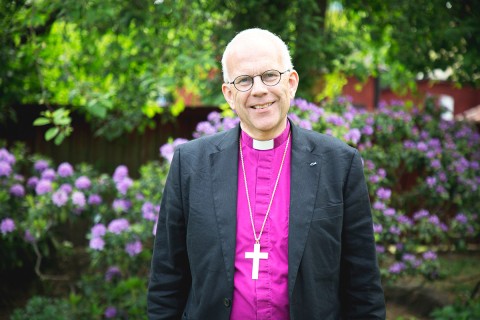Meet the Church of Sweden’s archbishop-elect
Martin Modéus will lead the national church during a time of profound change.

In June, the Church of Sweden selected a new archbishop. Martin Modéus, who is currently bishop of the Diocese of Linköping, will take office in December, replacing Antje Jackelén, who has served in the post for the past eight years. In a wide-ranging interview with the Century, Modéus said that he will continue existing efforts to reverse the decline in church membership, as well as to speak out on issues where human dignity and all of creation are threatened. Such issues are “not beyond the religious,” he said. “They are religious.”
Modéus said that the continuing decline in church membership—at the rate of 1 to 2 percent a year over the last couple of decades—is serious. But he pointed out that more than half of the Swedish population still belongs to the national church. “That is the big news,” he said.
The latest Church of Sweden statistics (2021) show that 5,633,867 people, or 53.9 percent of the population, continue to be members of the church, down from 5,728,746 in 2020. At the same time, the number of people who say that the Church of Sweden has an important role in society has grown from 40 to 58 percent.
After the Church of Sweden, the largest religious denominations in Sweden, as of 2020, were officially registered Muslims (2.3 percent), members of the Orthodox Church (1.4 percent), Catholics (1.2 percent), and members of the Swedish Pentecostal Movement (1.1 percent).
About 250,000 people belong to so-called free churches, according to the Swedish Free Church Council.
Ann Heberlein, a Swedish commentator who writes and speaks extensively on theology and ethics, said that the loss of members represents a serious threat to the Church of Sweden. She said that membership fees (averaging about one percent of a person’s annual income) account for about 60 percent of the church’s income.
Writing in the independent online magazine Kvartal, Heberlein said that part of the reason for the decline in membership is that the church continues to suffer from an identity crisis. What does the church want to be? she asked. A communion of believers or an opinion-maker?
“The Swedish church has unfortunately become a part of the culture war that is wrecking public discourse in Sweden,” Heberlein writes. She said that the church has all too often “stoked the fire” by taking positions on controversial issues, adding that there appears to be a lack of “self-awareness” within the church leadership of the current crisis.
Modéus conceded that a decline in membership also means a loss in church revenue. “If we lose members, we lose money, and it becomes more difficult to do what we do.” He added, however, that if the decline is a result of people losing confidence in the church, “that is, in fact, worse.” He said that “when we think about resources, we should not start with money; we should start with people.”
Other commentators have argued that the Church of Sweden has become too politicized under Jackelén’s leadership. They argue that she has allowed—even encouraged—the church to move too far to the left, leaving many Swedes who consider themselves to be on the center-right of the political spectrum to wonder whether there is a place for them in the national church.
As for Modéus, he said that the church “follows Christ, and sometimes that [means] people consider us [too far] right and sometimes they consider us [too far] left. And that’s something we have to live with.”
But some Swedes say that the church should refrain from weighing in on issues—such as climate change and the Israeli-Palestinian conflict—that they argue have little to do with religion and should be left to others. As one life-long church member put it, “There’s enough political confrontation everywhere else [in society], and the church doesn’t benefit from taking part in it.”




